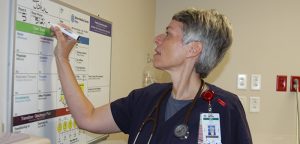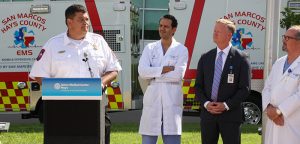By Cyndy Slovak-Barton
When it comes to something that frightens women, breast cancer is usually at the top of the list.
But according to local cancer specialists at Seton Hays and Austin Cancer Center, that doesn’t have to be the case.
With a survival rate upwards of 90% and with an integrated local team specializing in cancer treatment, women can stay local and get their mammograms, radiation and chemotherapy and surgery – all with local doctors.
Breast cancer is more common than any other cancer for women, with the exception of skin cancer. That’s one reason that Seton Hays surgeon Dr. Robert “Bud” Thompson wants to get the word out that women don’t have to travel to be treated. Thompson is Medical Director for Surgery at Seton Medical Center Hays and is also a general surgeon with Austin Regional Clinic’s Kyle Plum Creek offices.
“Quality cancer care is right here in this hospital,” he said. Thompson said he works with a wide range of specialists in the area to make sure that local women have what they need to have any cancer detected early.
Diagnoses comes from the mammogram, and Thompson pointed out that the new ARA facility across from the Hays Performing Arts Center in Kyle is a women’s designated Center. ARA has 3-D mammography, Thompson said, adding that it is state of the art.
With ARA, Seton, primary care, Texas Oncology, Austin Cancer Center, surgeons and oncologists all in the Kyle area, he is wondering why people would go anywhere else.
Lauren Ash, M.D., another physician with Seton Hays, said that the entire team will have remote cancer conferences, going over individual cases with physicians throughout the area.
Matthew McCurdy, M.D. of Kyle’s Austin Cancer Center deals with all kinds of cancer patients, with people coming in to his office every day for weeks. As a radiation oncologist, he sees patients daily for three to six weeks, every Monday through Friday.
When patients have to see their oncologist so many times, it is important to have a network that works together, according to both McCurdy and Dr. Boone Goodgame, who is a Seton Healthcare Family chemical oncologist and works with McCurdy in Kyle.
The network includes the doctors, but also the support staff and family members. Thompson points out that there is the convenience of having everything local, should some kind of medical problem arise later.
But there is also the idea that if you go to Houston for treatment, the family has to pick up the hotel fees, food and more. You also end up with disjointed care, Thompson said.
If you go to M.D. Anderson and then come back and have a complication, all kinds of problems can arise. You need to see the same doctor, Thompson pointed out, for continuity of care.
As head of surgery at Seton Hays, Thompson said that the same protocol is used locally for cancer patients as is used at M.D. Anderson. The protocol, as set up by the National Comprehensive Cancer Network, sets the steps that are to be taken in the fight against cancer. Whether in Austin, Hays, Houston or Chicago, the steps are all the same, Thompson pointed out.
He also said there is a comprehensive look at patients locally, that might not be the case in other areas. “We (the doctors) have each other’s cell phone numbers,” he said, adding that they consult constantly in care.
And, it helps to see doctors locally because the physicians can get patients in immediately, not having to wait for weeks for a visit, as larger facilities require.
“We can see people the same day here,” he said. The local care is better, faster and looks at the big picture, he said.
One thing that the local physicians and medical centers have done through Seton Hays is the use of a nurse navigator who works with each cancer patient.
Angela Walker smiles as the doctors – Thompson, McCurdy and Goodgame – glow about her work.
Walker coordinates various doctor visits for the patients; she answers questions, schedules visits, comforts and helps in any way she can. At this time, she is coordinating with 39 different cancer patients.
“I work for Seton, not for the doctors,” she said, adding that she is there to help patients in any way she can.
And that can take a lot of coordination.
Cancer patients, including breast cancer patients who may want reconstructive surgery, deal with a lot of doctors.
Goodgame begins to reel off the various doctors one patient may have to see – primary care, radiologist, surgeon, radiation oncologist, medical oncologist, plastic surgeon, pathologist, geneticist.
That’s where Walker comes in, with her coordination between offices.
But it’s also the reason local physicians feel it is so important for patients to “think local.”
“Because you have so many places to be, we’re working together and talking together,” Goodgame said. “It’s one system of coordinated care.”
That’s important, all the doctors say.
“For people all alone, it’s almost impossible to do this without support,” Goodgame said.
McCurdy agreed. “It helps you deal with everything.”
McCurdy, who said he got in to oncology because he likes patient interaction, said the support system is so important. There’s less fatigue, less depression, less burnout if you have the support needed, he said.
“If you have kids, they can’t go with you to Houston,” he said.
McCurdy also says that the local system has something that is unique – the idea of mindful meditation. A psychologist at Seton helps patients transition through the care and the move afterwards as they step past the intensive daily care.
“That’s the hardest time,” Goodgame said, adding that patients build a bond while they go through the experience.
It is a total body experience – dealing with the mind through meditation, the cancer in the body, the support of family, friends and coordinated physician services, that can make a difference.
That’s why the local group of physicians – no matter what organization they belong to – say they want patients to stay here, in Hays County, so that their care and well-being can be the best possible.










